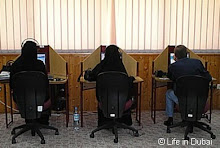One of the most frequently asked questions on various forums I'm active on is along the lines of "what salary do I need to live in Dubai, and to be able to save."
Some are more specific, quoting salaries they've been offered which are often four or five thousand dirhams a month.
Answers vary, but usually say that whatever the figure quoted is, it isn't nearly enough.
I always say "it depends" and try to explain, so that the questioner can work it out for her/himself.
It depends where you come from, what your standard of living is and therefore what standard of living is acceptable to you, how you want or are prepared to live, what your current salary is and whether you're able to save anything from that.
In terms of saving, the cost of living in your home country comes very much into the picture. Transfer a thousand dirhams to many countries and it's a huge amount, in others it won't buy you much more than a few meals out.
I know people here earning Dh100,000 a month, with luxury accommodation, family air fares, school fees, top medical insurance, a luxury car all paid by the company.
I know others being paid Dh2,000 a month and sharing a villa, living ten to a room. And yet others being paid Dh600 a month and living in storerooms.
As a general rule too, I find that those at the bottom of the ladder are often providing for an extended family back home, while those at the top of the salary ladder are usually responsible only for their immediate family.
What they have in common is that they all say they're better off than they were back home.
Gulf News had an illuminating full page yesterday on the subject.
The main story is about Diane, a Filipina now working in Dubai.
In 2004 she experienced what happens to so many people; to pay the placement fee, in the Philippines, for a job in Taiwan she borrowed from a loan shark. The employment deal was a scam, the money she borrowed disappeared and there was no job.
After a year she managed to find a job in Kuwait, on a salary of about Dh1,280. On that meagre salary she managed to not only pay off the loan shark but also apparently saved 'a few thousand dirhams'.
She returned home where there was an ailing mother to take care of and siblings needing money, so her savings didn't last long.
Like so many others she came to Dubai on a visit visa, did some visa runs while she searched for a job, and eventually after almost a year she found one that paid Dh2,500 a month. This was early 2007.
The story gives details of her expenses and lifestyle. She shares a room with seven others, eats cheap take-away lunches, buys storeable food to cook at home, such as canned goods and rice, rarely goes out.
She not only lives on the Dh2,500 a month, she saves between 20% and 40% of it and is helping her brother buy a property back home. The story tells us that in three years she has almost fully paid the equity line on the new home, which is equivalent to 19 per cent of the property value. "I'm almost down to a zero balance. And I did it without borrowing money! I paid the equity line in cash".
On a salary of Dh2,500 a month.
The story ends with the fact that it's not the lifestyle she dreamed of before she moved to Dubai, with its prospect of a high salary.
On the other hand, she hasn't gone back to the Philippines so the assumption has to be that she's yet another person doing better here than she would back home. She's able to live, to save, to buy a house.
It explains my 'it depends where you're from' answer to the question of 'how much do I need'.
Let's take Diane's current Dh2,500 a month and look at it from others' perspective.
No way in the world would an Aussie be prepared to live as Diane does - nor would a Brit, an American or many, many others. Share a room with seven others? Not on your life. We'd be so much better off back home.
We wouldn't be able to live on Dh2,500 a month, let alone save. It's about A$785, or GBP435, or US$680.
We wouldn't accept that kind of money anyway, a fraction of our 'back home' salary. Again, we'd be much better off back home.
On her small salary Diane's able to buy a house back home. To do the same thing an expat Sydneysider buying a house at the median price of A$630,000 (over Dh2 million) would be paying about Dh13,000 a month on a mortgage.
To live to a standard we're prepared to accept and be able to provide exactly the same things for when we go back to our home countries, it depends where you come from.
The Gulf News story gives an insight into what a lowly paid worker can do with a small salary and it gives some typical salary ranges for various job functions.
Gulf News has it
here.






















